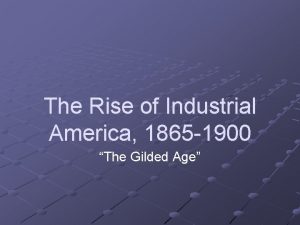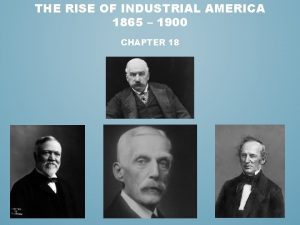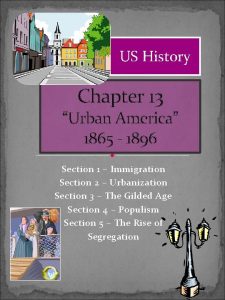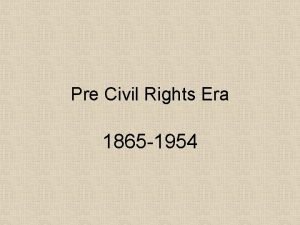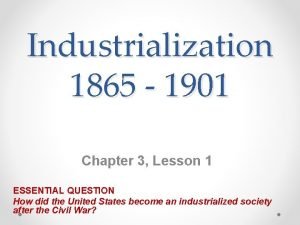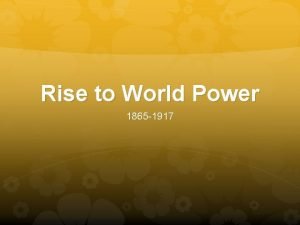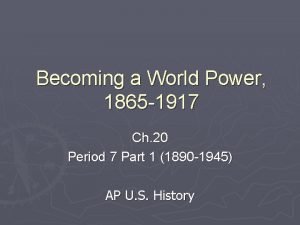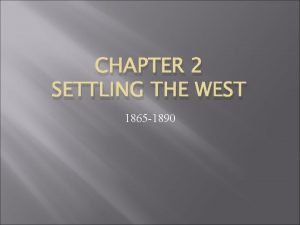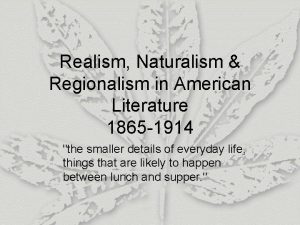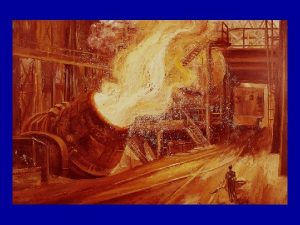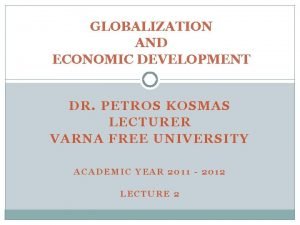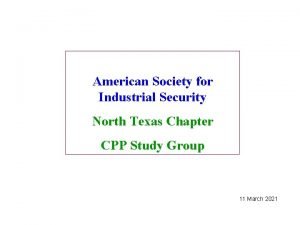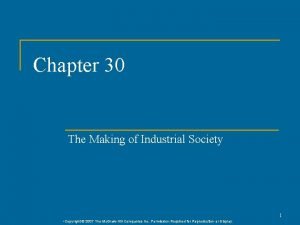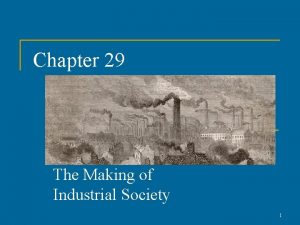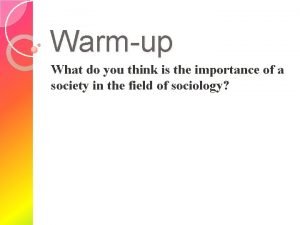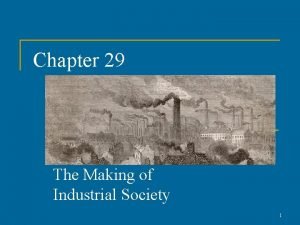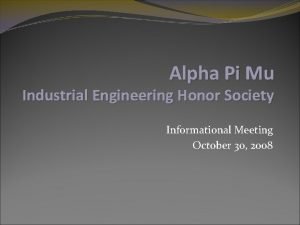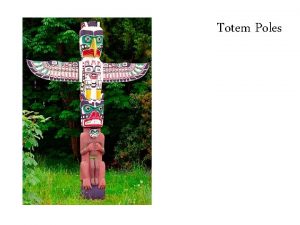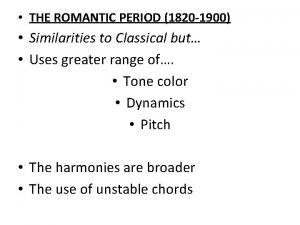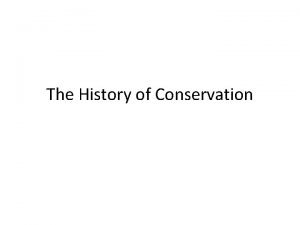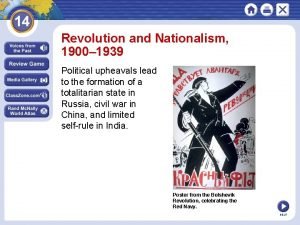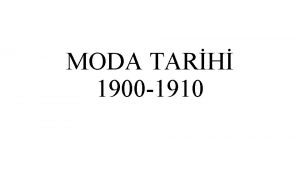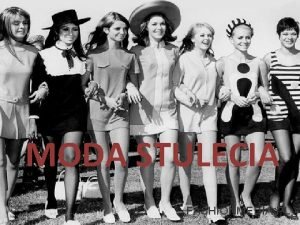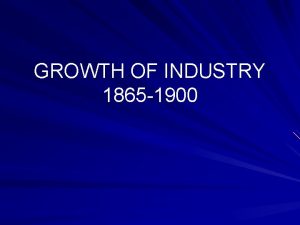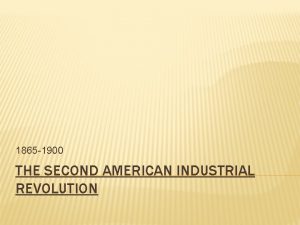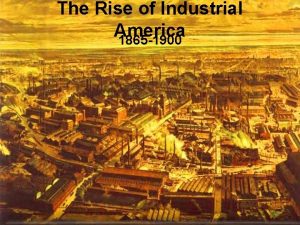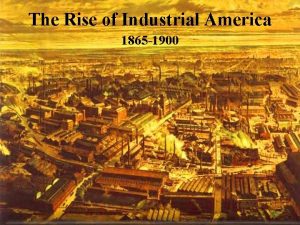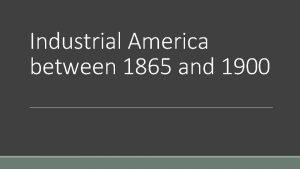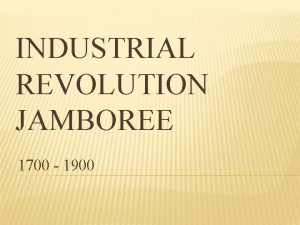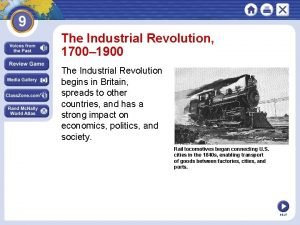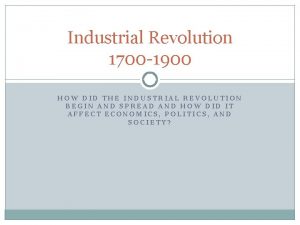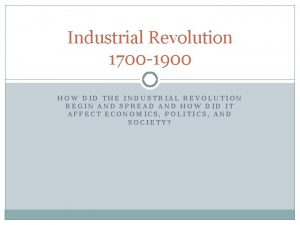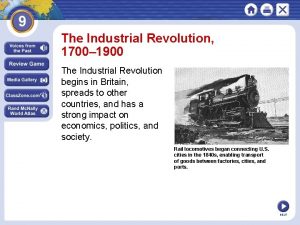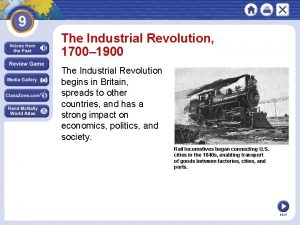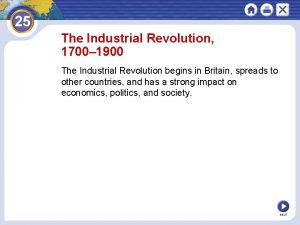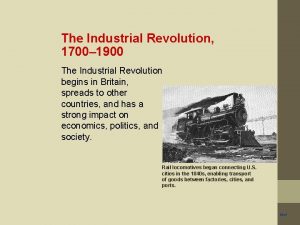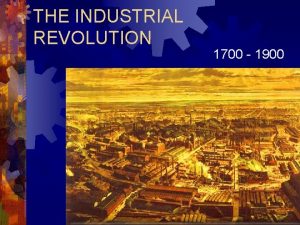18 The Industrial Society 1865 1900 Development of


































- Slides: 34

18. The Industrial Society 1865 - 1900

Development of an Industrial Nation o Interlocking industrial systems n n n n Wealth of natural resources Railroads (transportation) Telegraph (communication) Electricity / gas (energy) Finance capital (finance) New organizational ideas Growing pool of labor (immigration) o Results in a powerful industrial nation

Railroads o Nation’s first big business o Mileage increased from 35, 000 miles in 1865 to 193, 000 in 1900 o Had the greatest impact on American economic life

Railroads Shaped American Culture o o o A market for consumers A growth of other industries Created four time zones Railroad time became standard time Modern stock holder corporation, financial structure and business management.

Industry Forms Modern Colossus of (Rail)roads o Panic of 1893 caused financial problems in industry o J. P. Morgan and others bought them up and consolidated o Cornelius Vanderbilt becomes leader of industry o Cared very little about popular opinion

Early Attempts at Regulation o Did little good o Granger laws overturned in court o Interstate Commerce Act ineffective

Steel o Bessemer process developed o Industry grows in Great Lakes Regions o Andrew Carnegie o Pittsburg, Pa o Sold his company to J. P. Morgan and others for over $400 million in 1900. o First Billion Dollar corporation

Andrew Carnegie

Vertical Consolidation o Company controls all of the industrial process from mining to transportation o Carnegie Steel employed 20, 000 workers o Produced more steel than all the mills in Britain Carnegie Steel Railroad Steel Mill Tool Plant Chemical Plant Mine

Oil Industry o First discovered in 1859 by Edwin Drake in Pennsylvania o 1863, John D. Rockefeller founded Standard Oil o By 1881 his company controlled 90% of the industry

John D. Rockefeller

Horizontal Integration o A trust consisting of all the oil companies that Rockefeller purchased o Controlled the supply and prices. o Prices soared o At retirement, Rockefeller was worth $900 million Standard Oil ABC Oil Slimy Oil Black Gold Arab Oil Best Oil Nick’s Oil

Leaders are Viewed in both Positive and Negative Perspective o Captains of Industry n Applauded for their efforts in building this industrial nation n Built strong, powerful industries n Provided work for many o Robber Barons n Took advantage of their workers n Vicious in maintaining monopolies n Cut corners in dangerous ways

Industrialists became the most powerful force in politics and society.

Richest Men of All Time 5. William Gates III -- $60 billion 4. John Jacob Astor (1763 -1848) -- $85 billion 3. Cornelius Vanderbilt (1794 -1877) -- $100 billion 2. Andrew Carnegie (1835 -1919) -- $110 billion 1. John D. Rockefeller (1839 -1937) -- $200 billion

Anti-Trust Movement Response to public demand for control Sherman Antitrust Act of 1890 Limited the power of trusts Poorly worded Supreme Court said that it would only affect commerce, not manufacturing o US government basically supported the growth of business with Laissez-Faire o o o

Social Darwinism o Idea that Darwin’s ideas of natural selection should be applied to marketplace o Promoted the acceptance of extreme wealth and poverty o Scientific Explanation

Gospel of Wealth o Religious justification o “God gave me my riches. ” (Rockefeller) o God-given responsibility to fund civic philanthropy (Carnegie)

Technology, Inventions, and Innovations o Samuel F. B. Morse – telegraph o Cyrus W. Field – Transatlantic cable o Alexander Graham Bell - Telephone

Other inventions o o o o Typewriter Cash register Calculating machine Adding machine Kodak camera Fountain pen Gillette’s razor

Thomas Edison o Menlo Park, New Jersey o Introduced team concept of innovation o Electric light bulb o Phonograph o Movie projector o George Westinghouse created transformer.

Marketing Consumer Goods o R. H. Macy (New York) and Marshall Field (Chicago): Large department stores o Sears, Roebuck and Montgomery Ward: Mail order o Kellogg and Post: Packaged foods o Gustavus Swift: Canned foods

Impact of Industrialization o Raised the standard of living for most people o Created sharp economic and class divisions o Environmental damage o Totally reformed American society

The Workers

Worker’s World o Based on the “rhythm of work”. o Heavy machinery was often unsafe o The most productivity for the least money o Laborers often felt like parts of a machine. o Felt they were less than human.

Workers’ Concerns o o o Unsafe conditions Long hours Low pay Child Labor Exploitation of women

Labor Unions o First successful union n Knights of Labor n Terrance Powderly n Started as a secret fraternity o Oldest union still in existence n American Federation of Labor (AFL) n Samuel Gompers n Loose organization of skilled craftsmen

Labor Unrest Pullman Strike, 1894 Great Railroad Strike 1877 Homestead Strike 1892 Haymarket Riot, 1886

Effects of Strikes o The railroad strikes of 1877 and 1894 demonstrated the use of injunctions to end strikes. o The Haymarket Riot resulted in the perception that union members were anarchists. o Homestead Strike defined the relationship between workers and industrialists.

Which of the following did not contribute significantly to American industrialization of the late nineteenth century? a. b. c. d. e. Abundant resources Rapid population growth Investor confidence Growth of railroads None of the above

Which of the following industries was NOT transformed by a nineteenth-century invention by either Alexander Graham Bell or Thomas Alva Edison? a. b. c. d. e. Communications Power Entertainment Automobiles Public safety

Why did trusts form in the late nineteenth century? a. b. c. d. e. To increase efficiency To reduce costs To decrease competition To increase the supply of capital To loose money

The Bessemer process transformed the steel industry because it a. b. c. d. e. Required less capital Used far less labor Produced more durable steel Used cheap ore Made prettier buildings

The Haymarket Riot weakened the labor movement because it a. Linked labor and anarchism in the minds of many people b. Demonstrated the ineffectiveness of unions c. Revealed the violent nature of unions d. Initiated the use of court injunctions against strikes. e. Demonstrated how powerful unions are
 The rise of industrial america 1865-1900
The rise of industrial america 1865-1900 The rise of industrial america 1865-1900
The rise of industrial america 1865-1900 1865 to 1900 inventions
1865 to 1900 inventions Urban america 1865 to 1896
Urban america 1865 to 1896 Hollywood silver fox farm v emmett
Hollywood silver fox farm v emmett 15 th ammendment
15 th ammendment Chapter 3 lesson 1 the rise of industry answers
Chapter 3 lesson 1 the rise of industry answers Becoming a world power 1865-1917
Becoming a world power 1865-1917 Monet
Monet Becoming a world power 1865-1917
Becoming a world power 1865-1917 Guided reading activity settling the west 1865-1890 answers
Guided reading activity settling the west 1865-1890 answers Gregor mendel 1865
Gregor mendel 1865 Impressionism (1865–1885)
Impressionism (1865–1885) 1877-1865
1877-1865 Regionalism in literature
Regionalism in literature Industrialization (1865 to 1901 worksheet answers key)
Industrialization (1865 to 1901 worksheet answers key) Gertler econ
Gertler econ Industrial society
Industrial society Industrial society characteristics
Industrial society characteristics American society for industrial security
American society for industrial security Chapter 30 the making of industrial society
Chapter 30 the making of industrial society Chapter 29 the making of industrial society
Chapter 29 the making of industrial society Characteristics of pastoral society
Characteristics of pastoral society The making of industrial society chapter 29
The making of industrial society chapter 29 Industrial engineering honor society
Industrial engineering honor society 1750-1900 portfolio map
1750-1900 portfolio map What is a totem
What is a totem Characteristic of the romantic period
Characteristic of the romantic period Lacey act 1900
Lacey act 1900 Freud 1900
Freud 1900 Shridhar steels pvt ltd
Shridhar steels pvt ltd 1820-1900
1820-1900 Revolutionary leaders 1900-1939
Revolutionary leaders 1900-1939 Moda 1910
Moda 1910 Kapcie emu 1900
Kapcie emu 1900
